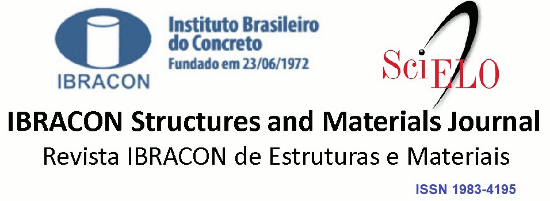This study describes the early-age behavior of high-strength concrete made with high initial strength cement and exposed to an environment with vibrations. A sequence of tests is presented which includes the molding of concrete specimens subjected to traffic vibrations, as well as a mechanical characterization and steel-concrete bonding tests. Results indicated that early age concrete specimens subjected to vibrations undergo losses in tensile strength and in their modulus of elasticity. Such reduction in stiffness may have a negative impact on structural serviceability and result in higher deflections. Thus, a reduction in tensile strength should be taken into account when designing rigid floors, given that tensile strength is a key factor which guarantees the system’s durability. The effect of vibration on early-age concrete and its effects on properties which influence the structural behavior of the system are discussed.
high-strength concrete; traffic-induced vibration effects; mechanical properties characterization tests; steel-concrete bond; pull-out test
